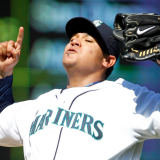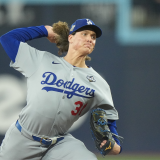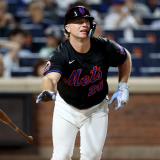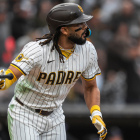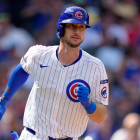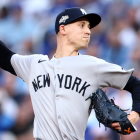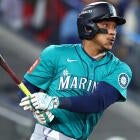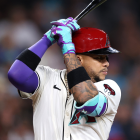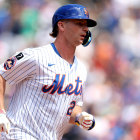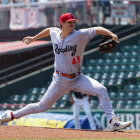Justin Verlander trade grades: Astros get 'A' for reuniting with veteran star, Mets continue to restock farm
Justin Verlander is heading back to Houston in the biggest deal of deadline day, so let's grade the trade

The Houston Astros and New York Mets agreed to a blockbuster three-player trade on Tuesday, sending right-handed ace Justin Verlander back to his former team just hours ahead of the 6 p.m. deadline. Whereas the Astros will reunite with Verlander (and will reportedly receive a cash infusion to help balance their books), the Mets will obtain minor-league outfielders Drew Gilbert and Ryan Clifford, two of the top handful of prospects in Houston's system.
We here at CBS Sports are the judgemental type, and one of the ways that manifests itself is by handing out instant trade grades at the deadline. Will this analysis age like wine, or like dairy? There's no way of knowing for sure, so we'd recommend viewing these pieces for what they are -- a snapshot in time -- and rolling with it. And hey, isn't this part of the fun of professional sports?
Before we get into it, let's recap the full deal as reported:
- Astros receive: RHP Justin Verlander, $35 million (and $17.5 million more if his 2025 option vests)
- Mets receive: OF Drew Gilbert, OF Ryan Clifford
Now, onto the gasbaggery.
Astros grade: A
The theme of this deadline has been reunions. The Dodgers brought back Joe Kelly and Kiké Hernández; the Angels did the same with C.J. Cron and Randal Grichuk; and now, in the biggest instance of a familiar face returning to a familiar place, the Astros are back in business with Verlander, the very same Verlander who they allowed to walk just last winter in free agency after winning the World Series.
It's fair to question what changed over the last half-year that made the Astros swing from thinking they could live without Verlander to knowing they couldn't. We think the answers are self-evident, but we'll present two of them anyway for posterity's sake: 1) the Mets were not offering to shoulder most of the financial load last offseason -- because that would be against the rules; and 2) the Astros were not fighting for their lives against the Texas Rangers in the American League West, and certainly not with a depleted pitching staff.
Indeed, the Astros rotation has been ravaged this season in multiple respects. Luis Garcia, Lance McCullers Jr., and José Urquidy are each sidelined with elbow or shoulder trouble; Cristian Javier, for his part, has encountered some performance-related turbulence. While the Astros have received more mileage than they could have reasonably expected from the likes of Hunter Brown, J.P. France, and Brandon Bielak, there's no debate about Houston's need for a rotation-stabilizing force. Verlander should be that, and then some.
Verlander may be 40 years old, but he's still a well-above-average pitcher. In 16 starts this season, he's amassed a 3.15 ERA (131 ERA+) and a 2.61 strikeout-to-walk ratio. He's been downright brilliant as of late. Across six appearances in July, he accumulated a 1.69 ERA and held opponents to a .477 OPS. What next year, and perhaps even the year after that, hold for Verlander is anyone's guess. For now, we feel comfortable writing that he greatly improves the Astros' chances of not only winning the AL West -- though the souped-up Rangers should continue to give them a fight -- but of winning another World Series ring.
Sure enough, SportsLine's forecast model has Verlander adding nearly two percentage points to Houston's title odds (from 14.3% to 16.1%). That's worth sacrificing two solid prospects for in our book, even if they happen to be the two best in your depleted system.
Mets grade: B
To state the obvious: the Mets would rather be acquiring star players and studying up for a playoff run, not trading them off and plotting for the winter. That's what they had designs on doing when they signed Max Scherzer (traded over the weekend to the Rangers) and Verlander, among others, in the first place. But if you accept that this season had become a lost year, and if you accept the inherent riskiness of relying on two older workhorses staying healthy and productive for another year, then you have to admit that using this deadline to pivot made a lot of sense.
And, if you ask around the industry, you'll hear back from rival front offices who believe that Billy Eppler and the Mets have done a swell job in the process -- particularly with respect to leveraging owner Steve Cohen's financial might and generosity to get back better talent than they would have otherwise received. Consider that in this trade, the Mets were able to extract arguably the two best prospects in the Astros organization in exchange for a 40-year-old starter. (Granted, the Astros have a below-average system and Verlander remains a high-quality starter, regardless of his age, but you get the point.)
Gilbert, 23 come September, was Houston's first-round pick in 2022 by way of Tennessee. He's since climbed the ladder in a hurry, spending most of this season in Double-A, where he's batted .241/.342/.371 with six home runs and six stolen bases. Scouts have long admired Gilbert's good speed, strong arm, and all-out playing style. He is and should remain an above-average fielder in center. Evaluators have had more reservations about Gilbert's offensive potential, with many projecting him as a fourth-outfielder type.
Clifford, 20, was an 11th-round pick in that same draft. Whereas Gilbert's game is built on athleticism, Clifford's is all about mashing. He has well-above-average raw strength and he pairs it with a plan at the plate. Clifford isn't much of a defender, though, and he might end up at first base or even hitting on a designated basis. He's certainly terrorized High-A pitching this season, homering 16 times in 250 trips to the plate, and he'll go as far as his bat takes him. We suspect he'll be heading to Double-A sooner than later.
When we hand out these grades, we don't just view the trades in a vacuum. We like to incorporate the greater team context. If you're taking half-measures when you have a golden opportunity to win a World Series, we're going to dock you even if you're coming out ahead on "value"; conversely, if you're taking a well-timed big swing, even at the cost of efficiency, we're inclined to give you additional credit. Baseball is ultimately in the entertainment business, after all.
With that in mind, we felt that we couldn't give the Mets an "A" here and ignore that this has been a disappointing season for them overall, even if they are doing a good job of salvaging an otherwise undesirable situation. If you're inclined to ignore that aspect, or to view the trade only on its own merits, then it seems perfectly fair to give them a higher mark. There's no one right answer.



